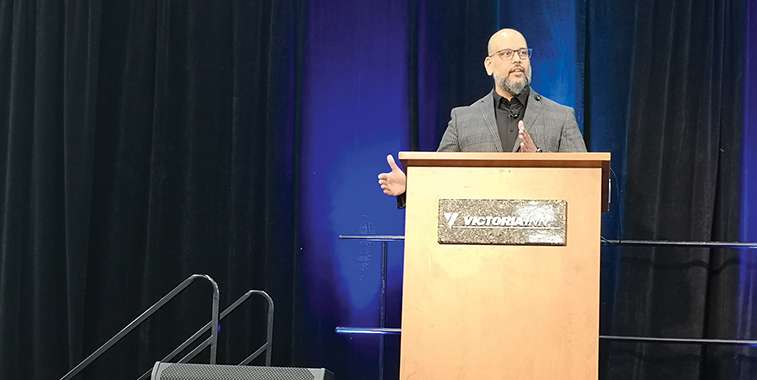By Peter Squire
A national organization with a strong local representation and an important stakeholder of the Winnipeg Regional Real Estate Board is Mortgage Professionals Canada (MPC). MPC is Canada’s mortgage industry association representing over 15,000 individuals and over 1,000 member firms. They have set high industry standards of ethics and best practices in conducting their business across the country. Their mortgage broker channel originates approximately $110 billion in annual economic activity (over 35% of all mortgages in Canada and 55% for first-time buyers).
In Winnipeg on June 16, 2022, MPC held an in-person mortgage symposium where their president and CEO, Paul Taylor provided an update on the association’s activities. It included efforts to engage government on issues such as how Canadians are managing their mortgages (e.g., extending amortization periods for first-time buyer insured mortgages) and matters such as increasing housing supply which other national associations are in lockstep with the Canadian Real Estate Association and Canadian Home Builders’ Association.
The Winnipeg Regional Real Estate Board’s 2022 president, Akash Bedi, Vice-President of External Relations & Market Intelligence, Peter Squire presented on the local housing market. Specifically, how it is faring with respect to a higher-interest rate environment and in comparison, to the record-shattering year of 2021 when there was over 18,500 MLS® sales worth $6.25 billion in dollar volume.
MPC had a panel session focused on navigating a rising interest rate environment with participation from some its leading local mortgage brokers such as Denis Brunet, who is MPC’s Manitoba’s representative, and Chad Wilson who is broker/owner of Ideal Mortgage Solutions.
Chad Wilson shares insights into the current mortgage rate environment with the Bank of Canada (BOC) set on increasing the overnight lending rate to a neutral rate as high as 3% versus when we started the year at 0.25%. Here are his observations and suggestions to existing Manitoba mortgage holders and those looking to take out a mortgage in 2022.
It is important to understand that in Canada housing policy and monetary policy are two quite different things. The Bank of Canada is tasked with monetary policy, and they have made it loud and clear that a 40-plus year high on inflation is not acceptable.
The overnight lending rate is a key rate that major financial institutions use to set their “prime” rates of interest. These prime rates are used in the calculation of variable rate lending products. As the BOC increases the key interest rate, they are aiming to reduce spending, with the goal to slow inflation.
You might be asking if you should you lock in? Well fixed rates are generally connected to bond yields and have already baked in the increases. But, in addition have priced in the fear of more increases to come. As it stands today, variable rate mortgages will come with a spread about 2% lower than the current fixed rates. Locking in today would effectively be fixing in an insurance policy on your mortgage payment until your next renewal — with a healthy 2% premium of course.
There is high speculation that we will see another increase to the overnight lending rate on July 13. I will not speculate what it will be, but there is talk that 75 basis points is on the table. Much of this expectation comes from the fact that the US Federal Reserve recently bumped its rate by 75 basis points. Personally, I do not look at that as a direct relationship to the BOC’s decisions. Adjustments in the key lending rates in the US have less impact on the target cause than they do in Canada. Canada is more sensitive to increases or decreases in the prime rates, so that needs to be considered when assuming that we will follow the US.
Recently, I read headlines warning of up to 45% increases to mortgage payments. This is a substantial number when you read it. But here is some math that is less daunting. If you are concerned that your 2% rate today (from 2021) is going to triple to 6% tomorrow (2026), then you need to average 3% more gross household income per year, every year, to cover that off. Wage inflation as of the end of May 2022 was close to 4%. This does not sound as bad when you break it down this way.
History has shown us repeatedly that variable rates outperform fixed rates. As for today, the spread between fixed and variable rates is around 2% different even with the increases to date. We have all saved a lot of money with a variable rate to date, which should not be forgotten. We are in for a bit of a bumpy road ahead, but that could all very well play out with a recession in this country, and ultimately a pull back on rates down the road. Locking in to fixed today is pricing in the fear — an insurance policy on your mortgage payment, if you will.
The BOC is not “out to get” anyone. They are simply trying to bring inflation in line. They want prices to stabilize to ensure that Canadians can afford to keep food on their table, and a roof over their heads.
Folks, we see the cost of goods and services all around us increasing beyond what we are used to. It is prudent to reflect on your family budget and make sure you are making responsible decisions. There is nothing more important than the roof over our heads, and the food on our table. Everything else is typically a luxury.
Peter Squire is the Winnipeg Regional Real Estate Board’s Vice-President External Relations & Market Intelligence.



